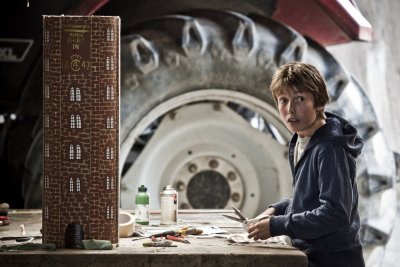Reviews - In A Better World
In A Better World
Reviewed By John Stakes

In A Better World
It is thankfully almost exclusively through film club membership these days that the opportunity to see on screen Oscar winning films in the category of “Best Foreign Language” arises. And last Sunday’s 2011 Oscar winner, the Danish and Swedish co-production “In a Better World” was a case in point.
Under its Danish title “Haevnen” (“Revenge”), the film’s main theme brings together two both separate and connected stories on the nature of injustice and the response to violence. Its Danish director Susanne Bier and screenwriter Anders Jensen apparently also wanted to puncture the general perception of Denmark as an idyllic place in which to live.
The moral dilemma loaded plot concerns Anton (Mikael Persbrandt), a Swedish doctor now living in Denmark but separated from his doctor wife because of his infidelity but still living in near perfect surroundings. His home conditions contrast sharply with those of the Sudanese refugee camp in which he works. A local sadistic war lord (Big Man) comes in “Of Gods and Men” manner for personal treatment to his injured leg. True to his Hippocratic Oath, Anton treats his wounds in return for demanding that no weapons and only a few guards are allowed inside the camp. After treatment the war lord shows such contempt for his victims particularly pregnant females that Anton feels compelled to drag him out which allows the man to be immediately lynched by locals.
Meanwhile back home Anton’s twelve years’ old son Elias is being bullied at school and is befriended by Christian, a boy with psychopathic tendencies who assaults the bully and threatens him with a knife. Both boys lie to their parents and police about the incident. If this were not enough both boys have issues with their respective parents, Elias because his parents are about to divorce, and Christian because his father told him his mother would get well when she was dying of cancer and lately willed her to die.
Later Anton is slapped and threatened by the father of another boy who has been fighting with Anton’s younger son, and tells him to leave his son alone. Elias tells his father not to accept this and Anton, with all three boys, visits the other boy’s father at work who again slaps Anton. This prompts Elias and Christian to take revenge by making a bomb to destroy the father’s works van. Inevitably matters worsen and Elias is seriously injured and hospitalised when the bomb explodes just as Elias is saving the lives of a passing mother and child. Anton’s estranged wife Marianne tells Christian he is a psychopathic murderer to stop him visiting Elias in hospital, and fearing Elias is dead, Christian contemplates suicide. Anton is conveniently on hand to rescue him.
The grave and weighty moral issues raised are clearly revealed. In the face of aggression do you forgive or fight? Does violence breed violence and does it diminish the individual? Is might right? Director Susanne Biel poses the questions but manipulates events and emotions perhaps too much so the issues are never allowed to breathe and develop naturally. There was just a bit too much going on and, as if she did not have complete faith in her original screenplay, Biel felt the need to feed third world deprivation, genocide, a touch of xenophobia, and marital breakdown into the moral mix to bolster her story. Consequently her film came across as calculating and lacking proper resonance and this reviewer felt more manipulated than truly involved.
It seemed as if Biel was willing not only to showcase most of the world’s problems, but chose also to resolve them by the moral equivalent of painting by numbers, so neatly were all the huge strands woven together by the film’s conclusion.
Biel nevertheless marshalled all her characters well and the acting, particularly from both boys, proved the most rewarding aspect of the film. The setting-up scenes were powerful as Biel’s camera sought out the moral dilemma etched on the faces of all concerned. The cinematography ravished and several shots of nature in action duly symbolised the human drama. The insistent musical score pounded out each and every turn of the moral screw. The American jury, perhaps more forgiving or accepting of emotional manipulation, awarded Biel’s film top international honours (and a Golden Globe) but, for this reviewer, “Of Gods and Men” was superior fare, and Biel’s solutions to these moral conflicts proved too simplistic. However he was clearly in the minority on this occasion as the captivated Keswick audience voted Biel’s Oscar winner the most popular film of the year. And, Biel fans could have a double helping of her wares last Sunday night as her “Things We Lost In The Fire” was screened later on BBC 2.
Under its Danish title “Haevnen” (“Revenge”), the film’s main theme brings together two both separate and connected stories on the nature of injustice and the response to violence. Its Danish director Susanne Bier and screenwriter Anders Jensen apparently also wanted to puncture the general perception of Denmark as an idyllic place in which to live.
The moral dilemma loaded plot concerns Anton (Mikael Persbrandt), a Swedish doctor now living in Denmark but separated from his doctor wife because of his infidelity but still living in near perfect surroundings. His home conditions contrast sharply with those of the Sudanese refugee camp in which he works. A local sadistic war lord (Big Man) comes in “Of Gods and Men” manner for personal treatment to his injured leg. True to his Hippocratic Oath, Anton treats his wounds in return for demanding that no weapons and only a few guards are allowed inside the camp. After treatment the war lord shows such contempt for his victims particularly pregnant females that Anton feels compelled to drag him out which allows the man to be immediately lynched by locals.
Meanwhile back home Anton’s twelve years’ old son Elias is being bullied at school and is befriended by Christian, a boy with psychopathic tendencies who assaults the bully and threatens him with a knife. Both boys lie to their parents and police about the incident. If this were not enough both boys have issues with their respective parents, Elias because his parents are about to divorce, and Christian because his father told him his mother would get well when she was dying of cancer and lately willed her to die.
Later Anton is slapped and threatened by the father of another boy who has been fighting with Anton’s younger son, and tells him to leave his son alone. Elias tells his father not to accept this and Anton, with all three boys, visits the other boy’s father at work who again slaps Anton. This prompts Elias and Christian to take revenge by making a bomb to destroy the father’s works van. Inevitably matters worsen and Elias is seriously injured and hospitalised when the bomb explodes just as Elias is saving the lives of a passing mother and child. Anton’s estranged wife Marianne tells Christian he is a psychopathic murderer to stop him visiting Elias in hospital, and fearing Elias is dead, Christian contemplates suicide. Anton is conveniently on hand to rescue him.
The grave and weighty moral issues raised are clearly revealed. In the face of aggression do you forgive or fight? Does violence breed violence and does it diminish the individual? Is might right? Director Susanne Biel poses the questions but manipulates events and emotions perhaps too much so the issues are never allowed to breathe and develop naturally. There was just a bit too much going on and, as if she did not have complete faith in her original screenplay, Biel felt the need to feed third world deprivation, genocide, a touch of xenophobia, and marital breakdown into the moral mix to bolster her story. Consequently her film came across as calculating and lacking proper resonance and this reviewer felt more manipulated than truly involved.
It seemed as if Biel was willing not only to showcase most of the world’s problems, but chose also to resolve them by the moral equivalent of painting by numbers, so neatly were all the huge strands woven together by the film’s conclusion.
Biel nevertheless marshalled all her characters well and the acting, particularly from both boys, proved the most rewarding aspect of the film. The setting-up scenes were powerful as Biel’s camera sought out the moral dilemma etched on the faces of all concerned. The cinematography ravished and several shots of nature in action duly symbolised the human drama. The insistent musical score pounded out each and every turn of the moral screw. The American jury, perhaps more forgiving or accepting of emotional manipulation, awarded Biel’s film top international honours (and a Golden Globe) but, for this reviewer, “Of Gods and Men” was superior fare, and Biel’s solutions to these moral conflicts proved too simplistic. However he was clearly in the minority on this occasion as the captivated Keswick audience voted Biel’s Oscar winner the most popular film of the year. And, Biel fans could have a double helping of her wares last Sunday night as her “Things We Lost In The Fire” was screened later on BBC 2.
Find A Film
Search over 1475 films in the Keswick Film Club archive.
Friends
KFC is friends with Caldbeck Area Film Society and Brampton Film Club and members share benefits across all organisations
Awards
Keswick Film Club won the Best New Film Society at the British Federation Of Film Societies awards in 2000.
Since then, the club has won Film Society Of The Year and awards for Best Programme four times and Best Website twice.
We have also received numerous Distinctions and Commendations in categories including marketing, programming and website.
 Talking Pictures
The KFC Newsletter
Talking Pictures
The KFC Newsletter
Links Explore the internet with Keswick Film Club


